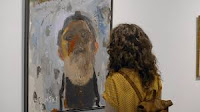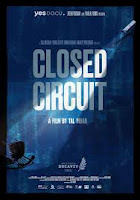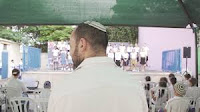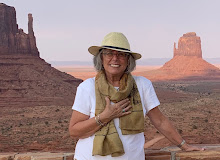For the past several years I have been a pre-screener of documentaries features and shorts for the Social Impact Media Awards. SIMA is an online platform founded in 2012 by Daniela Kon, to curate, promote and distribute documentaries (https://simastudios.org).
What has stood out every year is the number and quality of documentaries made in Israel, produced with private and public funding. It is a thriving scene that deserves ample distribution and scholarly assessment. Below I discuss a number of excellent titles, made between 2021 and 2024. I have included some of them in the Senses of Cinema World Poll of 2023 and 2024.
I have organized them in categories, according to their subject matter.
1. The Jewish experience in Europe in the 1940s: The Address on the Wall (2022), Budapest Diaries (2024), 999: The Forgotten Girls (2023) and The Partisan with the Leica Camera.
2. Autobiographical documentaries. Lives in the first-person: The Artist’s Daughter, Oil on Canvas (2022), Egypt, A Love Song (2022). Empty Handed (2021), How to Say Silence (2021), M/Other (2024) and We Used to Sing (2021).
3. Israel: Cultural history. People in Israeli context: The Bankers Trial / Mishpat Habankaim (2022, Israel), The Camera of Doctor Morris (2022), Private Death (2021) and Razzouk Tattoo / Yoresh Hakakuim (2022).
4. Israel: Contemporary history and politics. Israel in the Middle East: Closed Circuit (2022),
40 Steps / 40 Tzeadim (2022), Generation 1.5 (2022), Homeboys (2022), Mourning in Lod (2023) and #Schoolyard. An Untold Story (2021).
5. October 7, 2023. Chronology of a pogrom: We Will Dance Again (2024) and 06:30 (2024)
All these films are good examples of Ken Burns’ counterintuitive insight about documentary:
“To the general public, the word ‘documentary’ or ‘nonfiction film’ is a narrow band. And we think that the feature film is this huge magnificent spectrum. But if you really look at it, the feature film is governed by a formula and laws of plot that make it, I believe, the narrow band in the spectrum. And it’s the documentary, it’s the nonfiction film, that has so many glorious possibilities.” (Liz Stubbs, Documentary Filmmakers Speak, 2002).
I have arranged them chronologically, from newer to older, transcribing the reviews I wrote at the time I screened them for the SIMA Award. Each year has its own blog entry.
40 Steps / 40 Tzeadim (2022), Generation 1.5 (2022), Homeboys (2022), Mourning in Lod (2023) and #Schoolyard. An Untold Story (2021).
“To the general public, the word ‘documentary’ or ‘nonfiction film’ is a narrow band. And we think that the feature film is this huge magnificent spectrum. But if you really look at it, the feature film is governed by a formula and laws of plot that make it, I believe, the narrow band in the spectrum. And it’s the documentary, it’s the nonfiction film, that has so many glorious possibilities.” (Liz Stubbs, Documentary Filmmakers Speak, 2002).
2022
The Address on the Wall [2022, Ukraine / Israel] Dir. Serge Krutsenko. 60 min
Ukrainian filmmaker Serge Krutsenko wrote, directed, scored and produced this first-person essay framing Babyn Yar, the ravine outside of Kiev, Ukraine, the site of Nazi mass killings of Jews, and later others, as a meditation on the destruction of life by war and hatred. Filmed before the Russian invasion of Ukraine, the film opens with a short preface by the director linking Babyn Yar with the bombing of Kiev in 2022, making explicit the humanistic anti-war message of the film.
Explaining Babyn Yar to audiences who may know next to nothing about this Holocaust site - willfully ignored during the Soviet era - is a challenge, especially when this chapter of the Shoah is reenacted with little means and no sense of epic drama. The documentary portion is the narrator Alex Anski - who introduces himself as a radio and TV presenter. He walks throughout Kiev showing Jewish sites today. Intercut are the reenactments of the massacre: a young and clueless German soldier; the humiliation and killings of representative Jewish figures. Even though the dramatizations fall flat and the narrator voices platitudes, The Address on the Wall stands as a testimony to historical events.
The Artist’s Daughter, Oil on Canvas (2022, Israel) Dir. Margarita Linton. 60 min
In a first viewing, The Artist’s Daughter, Oil on Canvas is a first-person documentary about an Israeli filmmaker looking to reconnect with her artist father, following an retrospective of his self-portraits in Tel Aviv. The film follows her multiple failed attempts to do so, but what becomes clear two thirds into this fascinating “documentary” is that the documentary is deconstructing itself while we are watching it. Margarita Linton, in her supremely confident first feature, co-directed with her husband Yaniv Linton, reveals the quote/unquote documentary by filming the casting of the actor playing the voice of her father on the phone and staging an imagined encounter with him; by observing the artist who replicates her father’s paintings; and by interviewing the curator of the art show, who tells her there was no space for his painting “The artist’s daughter”, thus making her erasure tangible. We are told her father is Vladimir Lensky, a Jewish artist who emigrated from the Soviet Union to Israel in the 1980s; however, a quick google search by the viewer yields the name of someone else, a contemporary Ukranian artist from Odessa.
But what is true and raw is the emotional experience the writer / director subjects herself to in order to reach a catharsis, or at least accepting that her father does not want her in his life. At the end of the film, the viewer still does not know whether any of these two is accomplished. Linton’s story, however, feels real at a level beyond that of the film’s material existence. In fact, a documentary project about her father may not have been possible because of his refusal to participate in it. In this sense, Linton’s point of departure is similar to other directors in the SIMA 24 submissions, who succeeded in documenting specific family experiences: Anonymous Sister, Sam Now and A Silent Story. Besides nailing down her painful experience in the only possible documentary she could make with what she had, the director records an esthetic and emotional wish fulfillment.
From another angle, The Artist’s Daughter seems to follow the playbook of Exit through the Gift Shop (2010), where the still mysterious artist Banksy puts out a documentary about a street artist and amateur filmmaker in Los Angeles, that may not be a documentary after all.
The esthetic prowess of Linton’s gripping film – beautifully executed in terms of editing, cinematography and, yes, mise-en-scène - makes it a rich case study of the documentary's possibilities.
The Artist’s Daughter, Oil on Canvas (2022, Israel) Dir. Margarita Linton. 60 min
The Bankers Trial / Mishpat Habankaim (2022, Israel) Dir. Eliav Lilti
This Israeli documentary takes its cue from Michael Moore’s brand of first-person essays on political hot potatoes. The Bankers Trial was shot over several years, beginning in 2014, to capture the interactions and confrontations between Barak Cohen, a lawyer who defaults on a loan by the Leumi bank, and several bankers in Israel. A left-wing activist and a gadfly, Mr. Cohen wants to prove that banks in Israel are corrupt. This performance activism culminates in a lawsuit by the bankers, ending up in a plea bargain where the only charge to Mr. Cohen and his group is violation of privacy.
The documentary is energetically shot, full of bells and whistles in all departments – stylistic choices that are more distracting than effective. The tone is jokey, and the candid camera approach feels too gimmicky at times. Overall, a serious topic – the behavior of banking institutions in a capitalistic system – ends up getting a lightweight frivolous treatment.
The Camera of Doctor Morris (2022, Israel) Dir. Itamar Alcalay, Meital Zvieli. 74 min
The Camera of Doctor Morris is a triumph of found footage documentary filmmaking. The home movies taken by a Jewish British doctor who moved to Eilat, the Israeli port and resort town in the Negev desert, begin in the 1960s and record mundane events in his family life with an 8mm camera, without sound. Like Alan Berliner’s investigations of his own family (Intimate Stranger, Nobody’s Business) this documentary shapes home movies – snippets of life – into a beautiful and dramatic portrait of a family immersed in a time and a place. The narrative is organized mostly chronologically around the filmmakers’ interviews with the mother and three surviving children, now in their fifties, and heard in voiceover. Always behind the camera, the father is the absent figure on screen, though his strong personality is collated from the voiceover interviews. Also absent is the voice of the Down syndrome child, Aviva, who died at age 9. Her radiant presence provides the emotional and dramatic framework of the documentary.
The home movies are beautifully edited, with interesting jumps in time, to capture the span from birth to adulthood once each child is introduced. The family scenes are also provided with realistic sound effects – à la They Shall Not Grow Old(2018). The film thus acquires a lively quality that makes it flow like a breeze. It closes with a brief cell phone recording by the son of the now elderly Dr. Morris, whose last words are a celebration of life. It is followed by a brief sequence where we see each family member on screen, in two photos, then and now.
The Camera of Doctor Morris is a delight to watch. Students of the documentary film will find much to learn about how film can shape bits and pieces of life taken by cameras, and now ubiquitous phones, into narratives of universal insight.
Closed Circuit (2022, Israel) Dir. Tal Inbar. 55 min
The punch of this above par Israeli documentary lies in its extraordinary use of security camera footage. [The adjective is not an exaggeration]. A terrorist act by two Palestinians, shooting at the patrons of a crowded restaurant in a Tel Aviv mall, on June 8, 2016, is literally “reconstructed” by skillfully editing footage from multiple camera sources. Six years after the event, a handful of survivors are asked about the event and its traumatic aftermath, standing in front of the mall. These interviews of Israeli Jews and Arabs are illustrated exclusively by the security footage of cameras set up high up and edited following the chronology of the attack. The film moves briskly thanks to a clever use of split screens, blurry transitions, repeated shots, all at the service of organizing a confusion of images into a narrative chockful with drama and suspense, contained by a time and space. The only reenactment – acknowledged in the credits – functions as the restrained climax of the story.
The use of surveillance video is not uncommon in documentaries today; the work of German experimental filmmaker Harun Farocki, for example, shows how images are used to inform, persuade and instruct. Interestingly here, images from these security cameras are drained of any partisan meaning vis-à-vis the Palestinian conflict, so that the documentary centers on the cost of a terror attack on people, regardless of their ethnic and religious origins.
Written and directed by Tal Inbar, supported by a variety of public and private Israeli film organizations, and produced by Nancy Spielberg, Closed Circuit is a film to inspire documentary filmmakers on how to tell a story, packing a punch.
The Camera of Doctor Morris (2022, Israel) Dir. Itamar Alcalay, Meital Zvieli. 74 min
The home movies are beautifully edited, with interesting jumps in time, to capture the span from birth to adulthood once each child is introduced. The family scenes are also provided with realistic sound effects – à la They Shall Not Grow Old(2018). The film thus acquires a lively quality that makes it flow like a breeze. It closes with a brief cell phone recording by the son of the now elderly Dr. Morris, whose last words are a celebration of life. It is followed by a brief sequence where we see each family member on screen, in two photos, then and now.
Egypt, A Love Song (2022, Israel/U.S.) Dir. Iris Zaki. 74 min
This excellent interactive documentary provides a solid lesson on how to turn home movie material into a fascinating probe of family relations, and cultural, political and historical identity issues over three generations. Based on the family story of the director – the marriage of her Muslin and Jewish grandparents in Egypt the 1940s, and her own relationship with her father, their only son – the documentary skillfully weaves the strands of the personal (a riveting story) into a complicated tapestry of locales stretching over seventy years. Made up on conversations between the writer/director Iris Zaki and her very articulate father Moshe in Israel and New York, the film deftly combines found footage, Egyptian film clips (the grandmother, Souad Zaki was a young singer and actress in 1940s Egypt), family photos, newsreels (updated à la Peter Jackson’s They Shall Not Grow Old) and reenactments of key family moments. Following the playbook of Alan Berliner’s Intimate Stranger (1991), Egypt, A Love Song has been supported by a variety of Israeli media organizations, including the Israeli Public Broadcasting Corp.
Generation 1.5 (2022, Israel) Dir. Roman Shumonov. 80 min
This excellent documentary gives an in-depth view of the impact of Jews emigrating to Israel when the Soviet Union collapsed in 1991. It is done in the tradition of the expository documentary, aimed at informing, educating and entertaining its audience. Classic Grierson in its approach and execution. There is a distinctive category of documentaries that may fly under the radar because their style and form don’t call attention to themselves, or their subject matter is not flashy, progressive or in the headlines. Generation 1.5 is one of those works that accomplishes far more than what is initially announced. In this case, an engaging, no holds-barred examination of the wave of immigrants that arrived as children and adolescents to a society in the antipodes of Soviet Russia. Two key talking heads – a sociologist and a public intellectual – provide the political and cultural context for the stories of several men and women in their late 20s now who relate to camera how they have lived the immigration experience at a personal and family level. It is, in the words of an insightful young woman, “a grueling, tough and complex tale of courage … not an heroic tale of courage”. This is exactly what each one in this very articulate group brings to the documentary. Several emigrant parents are interviewed, sometimes in conversation with their now adult children, assessing the gains and losses in language and identity of the acculturation process.
Generation 1.5 relies on a wealth nicely integrated archival materials, from poignant home movies in the Soviet Union to television footage since the 1990s, B-roll and images of present-day Israel. To commend is the first-rate montage of the implosion of the Soviet Union.
Directed by established Israeli filmmaker Roman Shumunov (Back to Chernobyl, 2020) and cowritten with Raya Schuster, the 90-minute version seen here is either the first of three episodes, or a compilation of the 2022 documentary miniseries listed in IMDb. The series is distributed by the well-known Israeli outfit Go2Films so this cut could be for festival circulation.
Universal in the way it reflects the emigration experience past and present, and spot on in capturing its impact plus a host of issues attached to migration and settlement, Generation 1.5 is a documentary not to be missed.
Homeboys (2022, Israel) Dir. Tamar Goren. 60 min
This lovely observational documentary captures the creative process of two young South-Sudanese teenagers deported from Israel to Uganda. Over two weeks, in the boarding school for refugees and with the help of an Israeli musician, they compose and record hip hop songs. Low-key and insightful, Homeboys captures the joy, sadness and struggles of these two young musicians, and the other refugees in the boarding school, whose future looks bleak. The film, however, celebrates the resilience of the human spirit, via music and the protagonists’innate optimism that things may get better. Nicely edited and scored, the documentary makes the most of the verité approach.
The Partisan with the Leica Camera (2022, Israel) Dir. Ruth Walk. 55 min
This is a terrific historical documentary written and directed by Ruth Walk, a veteran Israeli filmmaker, that covers the life story of a Polish Jewish couple, who joined a partisan group in World War II. Similar stories have been told before, in oral histories, books and films, but this documentary offers a good case study on how old photos, insightful interviews and solid research become an "archeological dig" to reconstruct hitherto unknown lives that intersect with history.
Mundek Lukawiecki and Hannah Bern are remembered by their son, granddaughter and other people who knew them in the newly founded Israel, where they emigrated after the war. The record of their lives is mostly photos taken by Mundek, a professional photographer with a serviceable Leica camera, lovingly preserved by their son. The photos have been beautifully digitized, and used in interesting ways agains real life backgrounds, to provide a visual context to the war. Locations in Acre, Israel, and present-day Poland add to the vividness of the portraits. A larger picture also emerges sharply in the film, encompassing the Holocaust, the toll war takes on soldiers, the impact of the past in a family, and Israel as a place for a new beginning.
Deceivingly simple in its structure, elegantly executed (all the technical departments shine), The Partisan with the Leica Camera is another example of the quality documentaries supported by Israeli public and private cultural organizations.They speak of a level of excellence not easily found elsewhere.
Razzouk Tattoo / Yoresh Hakakuim (2022, Israel) Dir. Orit Ofir Ronell. 80 min





















No comments:
Post a Comment